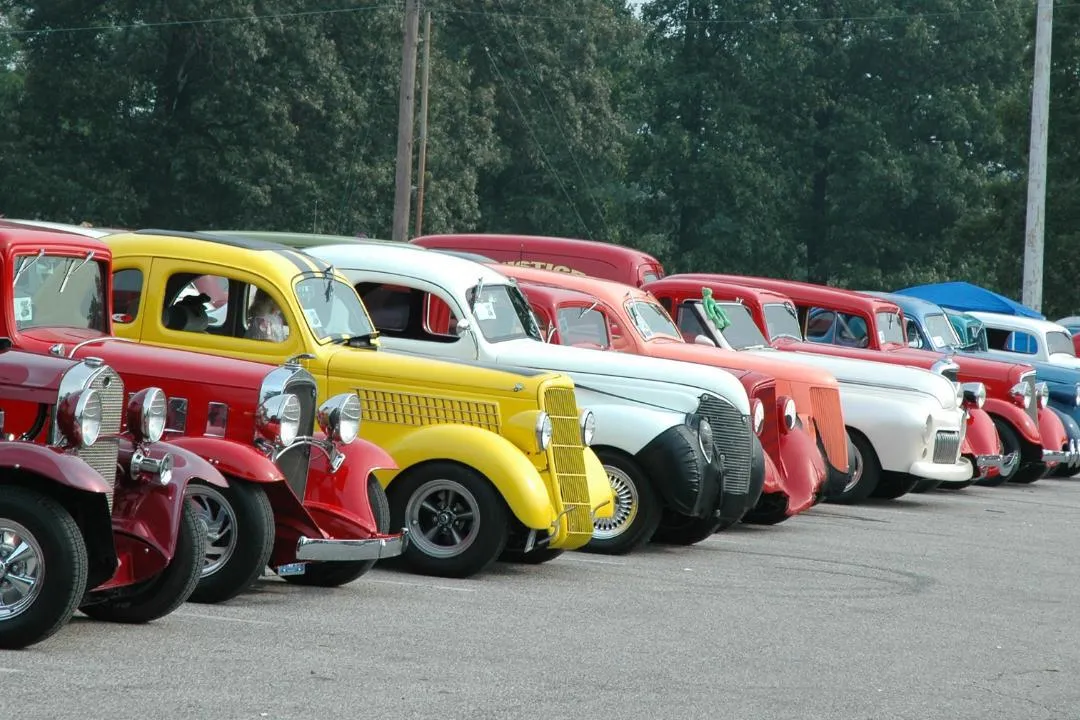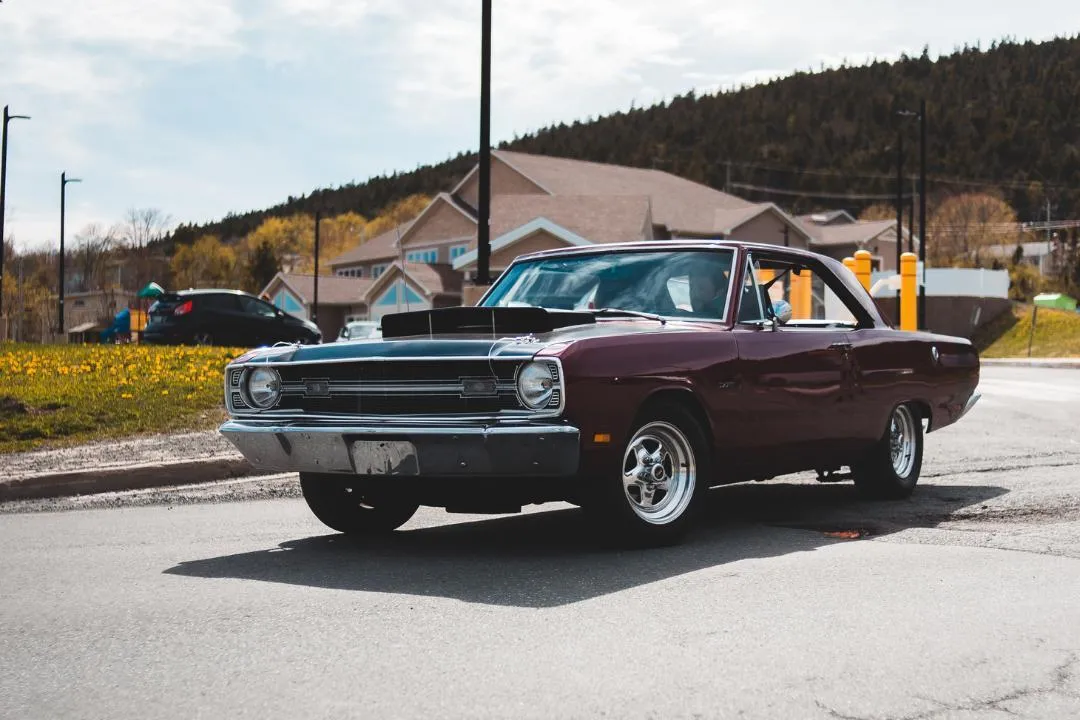Get your vehicle registered, fast.
State-by-State Classic Car Street Legal Registration Guide

Classic cars embody American automotive history, showcasing craftsmanship and the open road’s timeless charm. Driving a 1957 Chevrolet Bel Air or a 1920s Ford Model T connects you to a past era. But keeping it street-legal means navigating varied state rules. Each state sets standards for registering classic, antique, or historic vehicles, covering age, inspections, and usage limits. California enforces strict emissions standards, while Montana offers flexible non-resident options.
This guide provides a clear path to meet these rules, ensuring your vintage car is road-ready. Check your state’s Department of Motor Vehicles (DMV) for current regulations, as they can change yearly.
Key Takeaways
Understand classic car registration classifications and their legal impacts.
Navigate state-specific classic car laws across all 50 U.S. states.
Identify antique vehicle registration exemptions, like emissions or taxes.
Use strategies like Montana LLC registration to reduce costs.
Meet inspection requirements and gather required documentation.
What Qualifies as a Classic Car?
Registering a classic car starts with understanding what defines a classic, antique, or historic vehicle. These terms have legal weight, affecting registration, plates, and usage. Many states use a 25-year rule, qualifying vehicles 25 years or older as classics, often with special plates or emissions exemptions. Knowing these definitions ensures compliance with state laws.
Classifications of Classic Vehicles
- Classic Car: Typically 20 to 25 years old. A 2000 model may qualify in 2025 in some states.
- Antique Car: Usually 45 to 50 years or older, often requiring original condition. Many states offer tax exemptions.
- Historic Car: Preserved for historical value, limited to shows or parades. Historic plates restrict daily use.
- Vintage Car: Often pre-1960s vehicles, sometimes used interchangeably with classic or antique.
Importance of Classification
Classification impacts:
- Registration Type: Classic or antique plates cost less but may limit driving to shows.
- License Plates: Specialty plates like Antique or Historic need proof of age or condition.
- Emissions and Inspections: Classics often skip smog tests but may need safety inspections for brakes and lights.
- Usage Restrictions: Antique plates limit use to events like parades, not daily commuting.
Modifications and Build Considerations
Modifying a classic car, like adding a modern engine, can affect its status. Track cars without seatbelts or headlights often fail street legal requirements. Loud exhausts or illegal lighting, like underglow, can also cause issues. California may reclassify modified cars as specially constructed, requiring extra inspections.
Texas and Montana are more lenient if the car’s look stays intact. DIY vehicles, built from scratch, are specially constructed and need titles, part proofs, and inspections. California requires emissions compliance; Montana is flexible. Avoid removing safety features or skipping records to stay street-legal. Check state rules and document changes.

USA State-by-State Classic Car Registration Guide
Each state has unique rules for registering classic cars, including age thresholds, inspections, emissions requirements, and usage limits. States such as Montana, South Dakota, Wyoming, and Vermont allow non-resident registration through LLCs, offering more flexible registration pathways and simplified inspection requirements. Montana is a popular option due to its flat fee registration structure and availability of permanent plates for vehicles over 11 years old. Owners should be aware that some states may still assess use-based obligations if a vehicle is stored or primarily operated in-state, so professional guidance is recommended.
Texas and Florida are often favored for purchasing classic cars due to streamlined registration processes and flexible modification rules. Vermont is known for its long-standing registration method for older vehicles using a bill of sale when titles are unavailable. Alabama, Arkansas, and Mississippi do not require titles for many vehicles over a certain age, which can simplify ownership transfers. Montana is often considered one of the easiest states for classic car registration due to minimal residency requirements and straightforward rules.
Alabama
- Age Requirement: 25+ years for antique vehicle status. No title required for vehicles over 35 years old, needing only a bill of sale.
- License Plates: Antique vehicle plates available; standard plates optional.
- Emissions/Inspections: No emissions tests; safety inspections not required for antique plates, making it easier for modified classics.
- Driving Limitations: Limited to exhibitions, parades, or club events; no daily use.
Alaska
- Age Requirement: 25+ years for historic vehicle designation.
- License Plates: Historic plates issued; must display “Historic” sticker.
- Emissions/Inspections: No emissions or safety inspections required, ideal for modified or DIY vehicles.
- Driving Limitations: Restricted to shows, parades, or maintenance drives.
Arizona
- Age Requirement: 25+ years for classic or historic status.
- License Plates: Historic or classic plates available; personalized options offered.
- Emissions/Inspections: Emissions tests waived in metro areas for classics; safety inspections may apply to ensure street legality.
- Driving Limitations: Limited use for historic plates (shows, parades); classic plates allow broader use.
Arkansas
- Age Requirement: 45+ years for antique designation. No title required for vehicles over 45 years, simplifying registration.
- License Plates: Antique plates issued; standard plates allowed.
- Emissions/Inspections: No emissions or safety inspections required, lenient for modified classics.
- Driving Limitations: Restricted to occasional use (e.g., shows, tours).
California
- Age Requirement: 25+ years for historical vehicle status; pre-1976 for emissions exemption.
- License Plates: Historical or Year of Manufacture (YOM) plates available.
- Emissions/Inspections: No smog tests for pre-1976 vehicles; safety inspections for modified or DIY cars to ensure street legality. Track-focused modifications may require reclassification.
- Driving Limitations: Historical plates limit use to exhibitions or special events.
Colorado
- Age Requirement: 25+ years for collector plates.
- License Plates: Collector or Horseless Carriage plates offered.
- Emissions/Inspections: Emissions tests waived; safety inspections may apply for modified vehicles.
- Driving Limitations: Limited to non-commercial use (e.g., shows, parades).
Connecticut
- Age Requirement: 20+ years for classic status.
- License Plates: Classic or antique plates available.
- Emissions/Inspections: No emissions tests; annual safety inspections ensure street-legal compliance.
- Driving Limitations: No specific restrictions, but daily use discouraged.
Delaware
- Age Requirement: 25+ years for antique status.
- License Plates: Antique plates issued; porcelain plates for pre-1945 vehicles.
- Emissions/Inspections: No emissions or safety inspections required, lenient for modified classics.
- Driving Limitations: Limited to shows, parades, or maintenance.
Florida
- Age Requirement: 30+ years for antique designation.
- License Plates: Antique or custom vehicle plates available.
- Emissions/Inspections: No emissions or safety inspections required, making Florida a popular state for buying and registering classic vehicles due to its straightforward requirements.
- Driving Limitations: Restricted to exhibitions or limited recreational use.
Georgia
- Age Requirement: 25+ years for antique plates.
- License Plates: Antique plates issued; standard plates optional.
- Emissions/Inspections: No emissions tests for vehicles 25+ years; safety inspections may apply.
- Driving Limitations: Limited to non-commercial use (e.g., shows, parades).
Hawaii
- Age Requirement: 25+ years for historic status.
- License Plates: Historic plates available; must meet originality standards.
- Emissions/Inspections: Safety inspections required; emissions tests waived.
- Driving Limitations: Restricted to shows, parades, or educational events.
Idaho
- Age Requirement: 30+ years for old timer plates.
- License Plates: Old Timer or Classic plates offered.
- Emissions/Inspections: No emissions or safety inspections required, flexible for modified or DIY cars.
- Driving Limitations: Limited to exhibitions or occasional use.
Illinois
- Age Requirement: 25+ years for antique or expanded-use antique plates.
- License Plates: Antique or expanded-use plates available.
- Emissions/Inspections: No emissions tests; safety inspections for expanded-use plates ensure street legality.
- Driving Limitations: Antique plates limit to shows; expanded-use allows broader driving.
Indiana
- Age Requirement: 25+ years for antique designation.
- License Plates: Authentic or antique plates issued.
- Emissions/Inspections: No emissions or safety inspections required, lenient for modified classics.
- Driving Limitations: Restricted to shows, parades, or maintenance drives.
Iowa
- Age Requirement: 25+ years for antique status.
- License Plates: Antique plates available; standard plates allowed.
- Emissions/Inspections: No emissions or safety inspections required, ideal for DIY vehicles.
- Driving Limitations: Limited to non-commercial use (e.g., shows, tours).
Kansas
- Age Requirement: 35+ years for antique plates.
- License Plates: Antique or Year of Manufacture plates offered.
- Emissions/Inspections: No emissions or safety inspections required, flexible for modified cars.
- Driving Limitations: Restricted to exhibitions or limited recreational use.
Kentucky
- Age Requirement: 25+ years for historic status.
- License Plates: Historic plates issued; must be original or restored.
- Emissions/Inspections: No emissions or safety inspections required, lenient for DIY builds.
- Driving Limitations: Limited to shows, parades, or maintenance drives.
Louisiana
- Age Requirement: 25+ years for antique designation.
- License Plates: Antique or Year of Manufacture plates available.
- Emissions/Inspections: No emissions tests; safety inspections required for street legality.
- Driving Limitations: Restricted to non-commercial use (e.g., shows, parades).
Maine
- Age Requirement: 25+ years for antique auto plates.
- License Plates: Antique auto plates issued; standard plates optional.
- Emissions/Inspections: No emissions tests; safety inspections required.
- Driving Limitations: Limited to exhibitions or occasional use.
Maryland
- Age Requirement: 20+ years for historic status.
- License Plates: Historic or vintage plates available.
- Emissions/Inspections: No emissions tests; safety inspections every two years ensure street-legal status.
- Driving Limitations: Restricted to shows, parades, or maintenance drives.
Massachusetts
- Age Requirement: 25+ years for antique plates.
- License Plates: Antique or Year of Manufacture plates offered.
- Emissions/Inspections: No emissions tests; annual safety inspections required.
- Driving Limitations: Limited to non-commercial use (e.g., shows, tours).
Michigan
- Age Requirement: 26+ years for historical plates.
- License Plates: Historical or authentic plates available.
- Emissions/Inspections: No emissions or safety inspections required, flexible for modified classics.
- Driving Limitations: Restricted to club events, exhibitions, or maintenance.
Minnesota
- Age Requirement: 20+ years for collector plates.
- License Plates: Collector or pioneer plates issued.
- Emissions/Inspections: No emissions or safety inspections required, lenient for DIY vehicles.
- Driving Limitations: Limited to shows, parades, or occasional use.
Mississippi
- Age Requirement: 25+ years for antique status. No title required for vehicles over 35 years, needing only a bill of sale.
- License Plates: Antique plates available; standard plates optional.
- Emissions/Inspections: No emissions or safety inspections required, ideal for modified classics.
- Driving Limitations: Restricted to exhibitions or limited recreational use.
Missouri
- Age Requirement: 25+ years for historic plates.
- License Plates: Historic or Year of Manufacture plates offered.
- Emissions/Inspections: No emissions tests; biennial safety inspections required.
- Driving Limitations: Limited to non-commercial use (e.g., shows, parades).
Montana
- Age Requirement: 0+ years for vintage plates. Non-residents can register via LLCs, making it one of the easiest states for classic car registration due to its flat fee registration structure and availability of permanent plates.
- License Plates: Vintage or permanent plates available; no renewals for eligible vehicles.
- Emissions/Inspections: No emissions or safety inspections required, highly flexible for modified or DIY cars.
- Driving Limitations: No restrictions for vintage plates; ideal for collectors.
Nebraska
- Age Requirement: 30+ years for historical plates.
- License Plates: Historical plates issued; must be unrestored or original.
- Emissions/Inspections: No emissions or safety inspections required, lenient for modified classics.
- Driving Limitations: Restricted to shows, parades, or maintenance drives.
Nevada
- Age Requirement: 25+ years for classic or antique plates.
- License Plates: Classic, antique, or old timer plates available.
- Emissions/Inspections: No emissions tests for classics; odometer verification required for street legality.
- Driving Limitations: Limited to 5,000 miles annually for antique plates.
New Hampshire
- Age Requirement: 25+ years for antique plates.
- License Plates: Antique plates issued; standard plates optional.
- Emissions/Inspections: No emissions tests; safety inspections required.
- Driving Limitations: Restricted to shows or limited recreational use.
New Jersey
- Age Requirement: 25+ years for historic plates.
- License Plates: Historic (QQ) plates available; must be original.
- Emissions/Inspections: No emissions or safety inspections required, flexible for modified cars.
- Driving Limitations: Limited to exhibitions, parades, or maintenance.
New Mexico
- Age Requirement: 35+ years for antique plates.
- License Plates: Antique or Year of Manufacture plates offered.
- Emissions/Inspections: No emissions or safety inspections required, lenient for DIY builds.
- Driving Limitations: Restricted to non-commercial use (e.g., shows, tours).
New York
- Age Requirement: 25+ years for historical plates.
- License Plates: Historical or custom plates available.
- Emissions/Inspections: No emissions tests; annual safety inspections required for street legality.
- Driving Limitations: Limited to shows, parades, or maintenance drives.
North Carolina
- Age Requirement: 35+ years for antique plates.
- License Plates: Antique plates issued; standard plates optional.
- Emissions/Inspections: No emissions or safety inspections required, flexible for modified classics.
- Driving Limitations: Restricted to non-commercial use (e.g., shows, parades).
North Dakota
- Age Requirement: 25+ years for collector plates.
- License Plates: Collector or pioneer plates available.
- Emissions/Inspections: No emissions or safety inspections required, lenient for DIY vehicles.
- Driving Limitations: Limited to shows, parades, or occasional use.
Ohio
- Age Requirement: 25+ years for historical plates.
- License Plates: Historical plates issued; must be original or restored.
- Emissions/Inspections: No emissions tests; safety inspections may apply for street legality.
- Driving Limitations: Restricted to non-commercial use (e.g., shows, tours).
Oklahoma
- Age Requirement: 25+ years for classic plates.
- License Plates: Classic or antique plates available.
- Emissions/Inspections: No emissions or safety inspections required, flexible for modified classics.
- Driving Limitations: Limited to exhibitions or limited recreational use.
Oregon
- Age Requirement: 25+ years for special interest plates.
- License Plates: Special interest or antique plates offered.
- Emissions/Inspections: No emissions tests; safety inspections may apply for street legality.
- Driving Limitations: Restricted to shows, parades, or maintenance drives.
Pennsylvania
- Age Requirement: 25+ years for antique or classic plates.
- License Plates: Antique or classic plates issued; YOM plates available.
- Emissions/Inspections: No emissions tests; annual safety inspections required.
- Driving Limitations: Limited to non-commercial use (e.g., shows, tours).
Rhode Island
- Age Requirement: 25+ years for antique plates.
- License Plates: Antique or YOM plates available.
- Emissions/Inspections: No emissions tests; safety inspections required for street legality.
- Driving Limitations: Restricted to exhibitions or limited recreational use.
South Carolina
- Age Requirement: 25+ years for antique plates.
- License Plates: Antique plates issued; standard plates optional.
- Emissions/Inspections: No emissions or safety inspections required, lenient for modified cars.
- Driving Limitations: Limited to shows, parades, or maintenance drives.
South Dakota
- Age Requirement: 30+ years for antique plates. Non-residents can register via LLCs, similar to Montana, offering a straightforward and flexible registration process.
- License Plates: Antique or historic plates available.
- Emissions/Inspections: No emissions or safety inspections required, ideal for modified or DIY vehicles.
- Driving Limitations: Restricted to non-commercial use (e.g., shows, tours).
Tennessee
- Age Requirement: 25+ years for antique plates.
- License Plates: Antique plates issued; must be original or restored.
- Emissions/Inspections: No emissions or safety inspections required, flexible for modified classics.
- Driving Limitations: Limited to exhibitions or limited recreational use.
Texas
- Age Requirement: 25+ years for classic or antique plates. Known for lenient modification rules and straightforward registration.
- License Plates: Classic, antique, or YOM plates offered.
- Emissions/Inspections: No emissions tests; annual safety inspections required for street legality.
- Driving Limitations: No restrictions for classic plates; antique plates limit to shows.
Utah
- Age Requirement: 30+ years for vintage plates.
- License Plates: Vintage or historical plates available.
- Emissions/Inspections: No emissions tests; safety inspections may apply for modified cars.
- Driving Limitations: Restricted to non-commercial use (e.g., shows, parades).
Vermont
- Age Requirement: 25+ years for antique plates. The Vermont Title Loophole allows non-residents to register vehicles over 15 years old without a title, using a bill of sale, making it a go-to for lost-title classics.
- License Plates: Antique plates issued; must be original.
- Emissions/Inspections: No emissions or safety inspections required, highly flexible for DIY or modified cars.
- Driving Limitations: Limited to exhibitions, parades, or maintenance drives.
Virginia
- Age Requirement: 25+ years for antique plates.
- License Plates: Antique or YOM plates available.
- Emissions/Inspections: No emissions tests; annual safety inspections required for street legality.
- Driving Limitations: Restricted to shows, parades, or limited recreational use.
Washington
- Age Requirement: 30+ years for collector plates.
- License Plates: Collector or restored plates issued.
- Emissions/Inspections: No emissions or safety inspections required, lenient for modified classics.
- Driving Limitations: Limited to non-commercial use (e.g., shows, tours).
West Virginia
- Age Requirement: 25+ years for antique plates.
- License Plates: Antique plates available; standard plates optional.
- Emissions/Inspections: No emissions tests; safety inspections required for street legality.
- Driving Limitations: Restricted to exhibitions or limited recreational use.
Wisconsin
- Age Requirement: 20+ years for collector plates.
- License Plates: Collector or hobbyist plates issued.
- Emissions/Inspections: No emissions tests; safety inspections may apply for modified cars.
- Driving Limitations: Limited to shows, parades, or maintenance drives.
Wyoming
- Age Requirement: 25+ years for antique plates. Non-residents can register via LLCs, similar to Montana, with minimal requirements.
- License Plates: Antique or specialty plates available.
- Emissions/Inspections: No emissions or safety inspections required, ideal for DIY or modified vehicles.
- Driving Limitations: Restricted to non-commercial use (e.g., shows, tours).
Ready to ensure your classic car is street-legal? Services like Street Legal Hookup, operating virtually across all 50 states, can simplify the process with expert guidance. Contact them for a consultation to navigate your state’s requirements.
Why Classic Car Owners Trust Street Legal Hookup
Registering a classic car involves complex state laws. Street Legal Hookup has over a decade of expertise, helping thousands of collectors secure antique car registration, classic, and historic plates. Their virtual platform serves all 50 states with secure document submission. Here’s why they’re trusted:
- Proven Expertise: Over 10 years navigating DMV rules, from modified vehicle regulations to exemptions.
- Cost-Saving Solutions: Strategies like Montana LLC registration or the Vermont Title Loophole save thousands.
- Nationwide Support: Guided clients in strict states like California and lenient ones like Montana.
- Client-Centered Service: Endorsed by classic car clubs for reliable, efficient processes.
Frequently Asked Questions
What are the requirements to make a car street legal?
To make a car street legal, you’ll need a valid title, proper registration through your state’s DMV, and appropriate license plates. Most states also require valid insurance and a safety inspection to ensure brakes, lights, and other essentials meet standards. Classic cars often enjoy exemptions from emissions tests, depending on the state and vehicle age—always verify with your local DMV for specific requirements.
Are classic cars street legal?
Yes, classic cars can be street legal provided they meet state-specific registration requirements, including a title, insurance, and plates. However, some states impose usage restrictions or require periodic inspections. Ensuring compliance with your state’s laws is key to enjoying your classic on the road legally.
Can I build a car from scratch and make it street legal?
Absolutely, though it’s a detailed process. A scratch-built car requires a title, proof of parts used, and a thorough inspection to confirm safety and compliance. States like California have stringent rules, while Montana offers more flexibility. Keep detailed records of your build and consult your DMV to navigate the process smoothly.
What modifications make a car not street legal?
Modifications such as heavily tinted windows, excessively loud exhaust systems, or the removal of safety features like seatbelts can render a car non-street-legal. In California, modified engines must comply with emissions standards, while other states may have unique restrictions. Always review your state’s regulations to avoid violations.
How do I register a classic car?
Registering a classic car involves submitting a title, proof of insurance, a completed DMV application, and the required fees. Some states may ask for evidence of originality for historic plates. The process typically takes 2 to 6 weeks, but contacting your DMV for specific steps will ensure a seamless experience.
Can I drive my antique-plated car every day?
Generally, antique-plated cars are restricted to special uses like shows, parades, or maintenance drives in most states. However, Texas offers broader usage with classic plates. To avoid fines, check your state’s DMV guidelines to understand your plate’s limitations.
Are smog/emission tests required for classic cars?
Many states, such as California for pre-1976 vehicles and Texas, exempt classic cars from smog or emission tests. Others may still require safety inspections. To be certain, review your state’s current regulations or consult your local DMV.
Can I register my classic car in another state?
Yes, it’s possible but can be complex. States like Montana allow non-residents to register vehicles via an LLC with a flat fee. Working with a professional ensures compliance and helps navigate these interstate registration options effectively.
Do modified classic cars still qualify as classic?
Modified classics can still qualify, but it depends on the state. California might reclassify a modified car, while Texas tends to be more lenient. Document all modifications and check with your DMV to maintain your car’s classic status.
How long does the registration process take?
The standard registration process takes 2 to 6 weeks. With services like Street Legal Hookup using Montana LLC strategies, you can receive plates in as little as 3 days. For the most accurate timeline, confirm with your DMV.
What documents do I need to register a classic car?
You’ll need a title, a bill of sale, proof of insurance, and a completed DMV application. Some states may also request photos or other documentation for specialty plates. Reach out to your DMV for a full list tailored to your situation.
Final Thoughts on Registering Your Classic Car
Registering a classic car preserves automotive history. Montana’s LLC options provide a streamlined registration process compared to stricter local rules. Knowing age criteria, plate options, and usage restrictions ensures compliance. Avoid errors like missing titles to prevent fines. Check your DMV yearly. Your classic deserves to cruise legally.

Register or Title Your Vehicle From Any State, Stress-Free
Click below, answer a few quick questions, and start your registration in minutes.
Get Road-Ready EasilyREADY TO get street legal?
Register or Title Your Vehicle From Any State, Stress-Free.
Click below, answer a few quick questions, and start your registration in minutes.

Register or Title Your Vehicle From Any State, Stress-Free. Guaranteed
Street Legal Hookup
Register Your Vehicle
LEGAL
STREETLEGALHOOKUP.COM IS A MONTANA VEHICLE REGISTRATION COMPANY, UNAFFILIATED WITH ANY GOVERNMENT AGENCY © 2026 Street Legal Hookup Inc. All rights reserved. Privacy Policy | Terms Of Service
